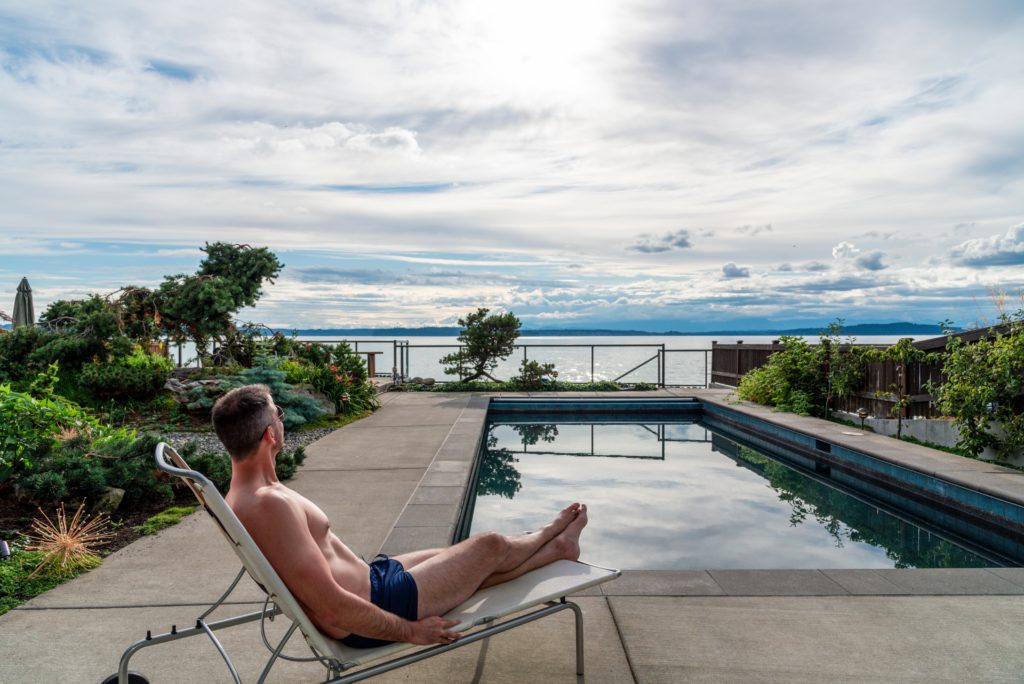- calendar_month May 4, 2023
While some people are struggling to get housing loans for their first homes, a somewhat new business model is taking some strain out of the price on a second home. That’s great news for those in the luxury home market. Yet, neighbors of these definitely-not-a-timeshare properties aren’t quite as thrilled. It’s called fractional ownership. And it’s fittingly divisive.
The Post-Pandemic Journey of Owning a Second Home
Photo credit: Envato
Fractional ownership is yet another way that the global pandemic changed the trajectory of the real estate industry. With cabin fever at its worst, wealthy families were desperate to escape from their luxury lockdowns. Travel was mostly out of the question since the world had ground to a halt. And even if they could purchase time at a resort, it would come with the risks associated with the pandemic.
The solution? Purchase a share of a luxury home in a coveted neighborhood like Newport Beach, Palm Springs, or the Sonoma Valley. Thus, fractional ownership began to take off.
Experiencing the Pacaso Way of Fractional Ownership
In California, San Francisco-based Pacaso is easily the most recognized name in fractional ownership. Their approach involves them creating an LLC to purchase a luxury home, typically two to four times a neighborhood’s median market rate, and dividing it into eight shares. These shares are then sold through their website. It’s a model promising a hassle-free, more cost-effective means of purchasing that second home.
Photo credit: Envato
Some flexibility comes with the territory when sharing a luxury home with seven other parties. By owning a share in a Pacaso property, you are entitled to 44 nights a year, though visits cannot stretch for longer than two consecutive weeks.
However, a single party can purchase multiple shares of a property. Pacaso promises that, in most cases, visits to an owned property can be scheduled in as little as two days or reserved two years in advance.
As a managing entity, Pacaso also takes care of a lot of the details of owning a second home, from furnishing the property to keeping it cleaned and maintained. It’s all part of their mission to modernize the purchase of a second home. And that comes at a monthly fee. Of course, those using Pacaso’s services shouldn’t have a problem affording it.
The Meet-and-Greet of Revolving Door Neighbors
Photo credit: Envato
But residents of the upscale neighborhoods Pacaso services aren’t always thrilled to receive new neighbors; especially a set of eight new neighbors. Though purchasing a Pacaso property technically counts as home ownership, there’s an obvious difference between a full-time resident and one who spends 44 days a year in a luxury home.
This merry-go-round of neighbors begins to look a lot like a timeshare property. And people who rent timeshares often do so to party. The result? Tranquil communities populated by well-to-do families and retirees are now punctuated by raucous vacation homes. And this timeshare-that-isn’t-a-timeshare perspective is pushing local governments to scramble for a solution.
The Rush to Regulate Fractional Ownership
Across the state of California, lawmakers are trying to determine the best way to regulate fractional ownership companies like Pacaso. In the Coachella Valley, a hot spot for Pacaso properties, the city of Palm Springs issued a cease and desist to the company. In Beverly Hills where it seems every home is a luxury home, commissioners are backing an ordinance to ban fractional ownership. The Newport Beach City Council devoted a hearing to the matter on March 14. They are still mulling over whether to add fractional ownership to a similar ordinance that prevents timeshares.
Photo credit: Envato
While Pacaso has expressed an openness to regulation, they plan to fight any attempts to outright ban their services. And they’re taking the matter seriously, evidenced by the recent establishment of a government advisory board. Representatives of Pacaso maintain that the distinction of ownership that separates a shared second home from a timeshare is a significant one.
More Pros (or Cons) of Fractional Ownership
Some citizens worry that fractional ownership diminishes a community by replacing permanent residents with temporary ones. But Pacaso argues that they’re making more efficient use by consolidating second homes. In their model, a home is rarely empty. This means more money for local businesses.
Lawmakers have also expressed concern that Pacaso is contributing to a housing shortage by taking much-needed properties off the market to serve as second home properties for wealthy clients. But Pacaso points out that a lavish, luxury home is not ideally a factor in the housing shortage. These properties were going to be used as second homes no matter what. Pacaso claims they are instead creating inventory by consolidating demand.
Photo credit: Envato
It’s this regulatory flux that has so many eyes watching Pacaso. But if they manage to clear local government, we’ll likely see more companies adopt the model of buying luxury homes and dividing them up for fractional ownership. Has fractional ownership permanently changed the luxury home niche of real estate? We’ll find out on the other side of the red tape.





